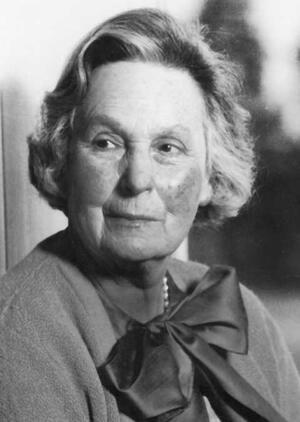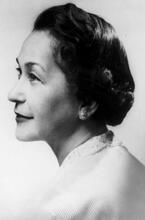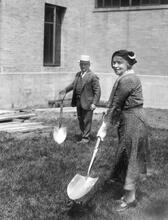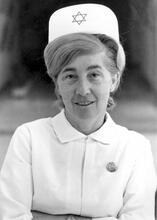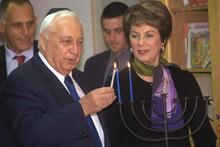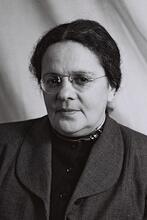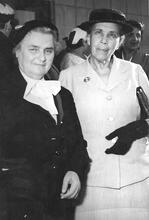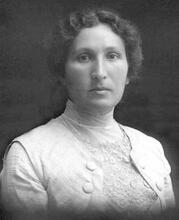Mathilde Dorothy De Rothschild
Just before her eighteenth birthday, Dorothy Pinto became Mrs. James de Rothschild and was thrust into the center of the whirlwind of the political, social and Zionist life of the Rothschild family. She joined in their work on behalf of Jewish settlement in Palestine, playing a prominent role in the family's contribution to developing various aspects of the State of Israel.
Photo © Yad HanadivMathilde Dorothy De Rothschild, born in 1895 in London, entered into Zionist politics swiftly after marrying her husband, James. Her husband was deeply invested in the future of Israel and the Jewish people, thus Dorothy also became involved and interested in this movement. As her husband’s health deteriorated, Dorothy took on many of his responsibilities, including his parliamentary constituency. She became a member of the Buckinghamshire County Council and was a Justice of the Peace in the Aylesbury law courts. She won many awards for her activism and support in Israel, but none of these rewards could adequately account for the unique and lasting contribution she made to Israeli society.
Early Life and Marriage
Mathilde Dorothy (Dolly) de Rothschild was born in London on March 7, 1895, to Eugene Pinto (1854–1932) and Catherine Pinto (née Cohen, 1872–1939). Her brother, Richard (1892–1969), who became a major in the British Army, had two children. Her father was descended from a family which, before moving to Paris, had owned large land-holdings in Egypt, where his grandfather had acted as adviser to the Khedive. The family moved west from Egypt in the second half of the nineteenth century. Eugene Pinto acquired British citizenship, which enabled him to work on the stock exchange, after which he became one of the country’s first cinema proprietors. Dorothy’s maternal grandfather, Levi Cohen, had been one of the founders of the major Liberal Synagogue in London.
Dorothy was educated at home and in private classes in London. Her father always spoke French to her so that she would grow up bilingual. On February 25, 1913, shortly before her eighteenth birthday, she married James de Rothschild (1878–1957) and so moved virtually out of the schoolroom into a whirl of political, social and Zionist life. When her husband was mobilized into the French army in 1914 Dorothy was left to act as the intermediary between him and his father and Dr. Chaim Weizmann, who was then living in London. Thus she became deeply immersed in all facets of Zionist politics.
Interest in Zionism
In 1917, when her husband went to Palestine with the British army, Dorothy lived with her parents-in-law in Paris. Here she learnt in detail about the Jewish settlements which Baron Edmond was supporting in Palestine and almost daily she talked to him about his hopes and dreams for the Promised Land. One of the Baron’s settlements, Shadmot Devorah, was named after her.
After World War I, she accompanied her husband to Canada and the United States, where James was successful in arousing interest in the future of the Jews in Palestine Throughout the succeeding years she met, and in many cases became a close friend of, many Jewish politicians and Israeli personalities who constantly came to see her husband.
Roles and Responsibilities
James’s continued ill health was an ever-present preoccupation, and Dorothy’s help, both in his parliamentary constituency and in many other fields, proved invaluable to him. During the last years of his life, when his mind was as brilliant and active as ever, he was almost blind, and she took part in his affairs. Throughout this period, Dorothy maintained a busy life on her own account—running large houses in London and the country, being a member of the Buckinghamshire County Council and a Justice of the Peace in the Aylesbury law courts. During World War II she held a responsible post in the Civil Defence and was awarded the M.B.E.
On James’s death in 1957, Waddesdon Manor was bequeathed to the National Trust, who asked Dorothy to be chairwoman of its Management Committee and thus be responsible for showing the house and its contents to the public. It is visited by some 100,000 visitors annually.
In accordance with her husband’s wishes, she also assumed the presidency of the trusts he had formed for the purpose of supporting science, art and culture in Israel, and for helping Jews in other lands. She gathered together a notable group of trustees to help her in this work, which included the development of Educational Television and the Open University and the construction of both the Lit. "assembly." The 120-member parliament of the State of Israel.Knesset and the Supreme Court.
Legacy
In 1968 Dorothy de Rothschild received the Henrietta Szold award; in 1969 she was made an Honorary Doctor of the Hebrew University and in 1982 she was made a Freeman of Jerusalem. No prize or citation, however, could reward her adequately for the unique and lasting contribution she made to Israeli society. She remained the spirit behind the activities of the staff of the Rothschild Foundation, instilling in them the fervor of her predecessors in carrying out what she termed “a labor of love.”
Dorothy de Rothschild, “Mrs. James” as she was commonly referred to, died on December 10, 1988. She was buried at the Willesden (Jewish) cemetery and a memorial service was held at the Bevis Marks Synagogue in London.
Bousquet, G.-H. "Un Document Concernant La Fortune De La Famille Rothschild." Revue D'histoire économique Et Sociale 32, no. 3 (1954): 329-31.
Muhlstein, Anka. Baron James: The Rise of the French Rothschilds. Paris: Random House, 1984.
Reinharz, Jehuda. "Science in the Service of Politics: The Case of Chaim Weizmann during the First World War." The English Historical Review 100, no. 396 (1985): 572-603.

